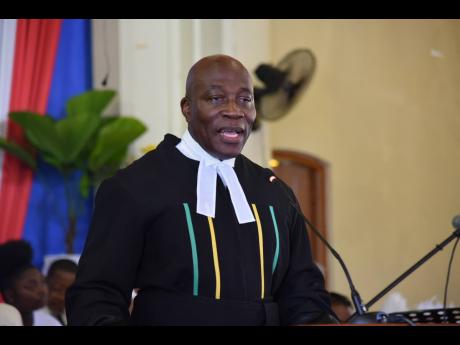Chief justice urges cops, prosecutors to stop delaying justice with incomplete files
WESTERN BUREAU:
In a message to the investigative agencies of the Crown and the State, Jamaica’s Chief Justice Bryan Sykes has warned that the courts will not continue to accommodate the significant inefficiencies in the submission of court cases.
Yesterday, Sykes took the police to task, particularly for their practice of arresting persons and submitting largely incomplete files. He said this needs to stop.
“It is a terrible practice. The person is placed before the court, the file is incomplete, bail is oftentimes opposed on various grounds, then what is accomplished is what is known as a judicial remand,” he told members of the judiciary and congregants at the William Knibb Memorial Baptist Church in Falmouth, Trelawny, Sunday morning.
He was speaking at the Annual Assize Church Service marking the Michaelmas Term session of the Trelawny Circuit Court, under the theme: ‘Equity and Justice in Changing Times’.
Not one to mince his words, the chief justice said the practical effect of what transpires is to interrupt the cause of connecting the law between the initial arrests, as time spent in custody, giving the persons in custody the ability to claim for false imprisonment, which is successfully fought.
“That needs to be brought to an end. The completion of files is therefore necessary for the wheels of justice to turn efficiently and quickly,” he stressed.
RESTORING TRUST IN SYSTEM
According to Sykes, the judiciary is now in the business of restoring and enhancing trust and confidence in the court system and will not continue to accommodate the current situation.
He argued that not only has accommodating the inefficiencies contributed to a backlog in the parish, circuit and regional gun courts, but, to a small section of the population, this has led citizens to lose faith in the courts.
“And so, what is critical and has always been critical is the fair and efficient delivery of justice,” he stated, acknowledging that while times may change, the need for fair and equitable justice has not.
His suggestion is that, when all improve in the areas, they will get closer to the standard of a first-class legal system where rights are respected and upheld and high standards apply.
For him, there are four things “excellent courts” do and courts that are striving to become excellent must do, whether they are based in developed or developing countries such as Jamaica.
First, he said, excellent courts review the conduct of proceedings and, based on an analysis and description of work processes, identify aspects of court proceedings for improvement.
Sykes outlined that timeliness and foresight are crucial.
Excellent courts, he said, also manage cases against benchmarks for timely case processes, and the critical work phrases against those benchmarks.
The chief justice added that excellent courts review processes, procedures, and the role of the judge and the court staff to ensure efficient court processes. They also drive improvements to increase productivity and ensure timely delivery of results with high quality.
“These four things are critical to our desire and will to build a work culture of excellence within our courts. We need to deliver high-quality results every day, every week, every month, and every year. It must become a habit of thoughts and reflected in our actions,” he stated.
EXCEEDING GLOBAL STANDARDS
Improvement, he said, is obvious, but they are not there as yet. However, of note, he said, was the fact that the island’s parish courts have exceeded the global standard of excellence, with only three per cent of active cases in backlog.
“Our Court of Appeal is clearing its backlog. Our revenue court and the high court division of the Gun Court in Kingston are backlog-free,” Sykes told the gathering, adding that the excellent performance of the parish courts has put them in a position to establish new and reduced time standards for criminal cases. This is the first time in the history of the country that a chief justice has been able to speak about reduced time standards.
In fact, the new time standards of criminal cases coming through the parish courts sees simple cases concluded in four months, standard cases, in four to nine months, complex cases, in nine to 12 months, and higher complex cases in 24 months.
For the Gun Court in Kingston and Montego Bay, the time standards are: simple possession, six months; cases of shooting and wounding with intent, nine months; and other cases, 12 months.
“There is no technological reason for not meeting these standards. The technology is here in Jamaica to have the necessary certifications and forensic certificates for the courts.
To keep the momentum going to ensure that excellent courts also recognise success, he said, they have instituted the long-overdue rewards and recognition programme.
He was quick to point out that this was not a competition among judges “as one person seems to have thought”, but, instead, a recognition of excellent work.

